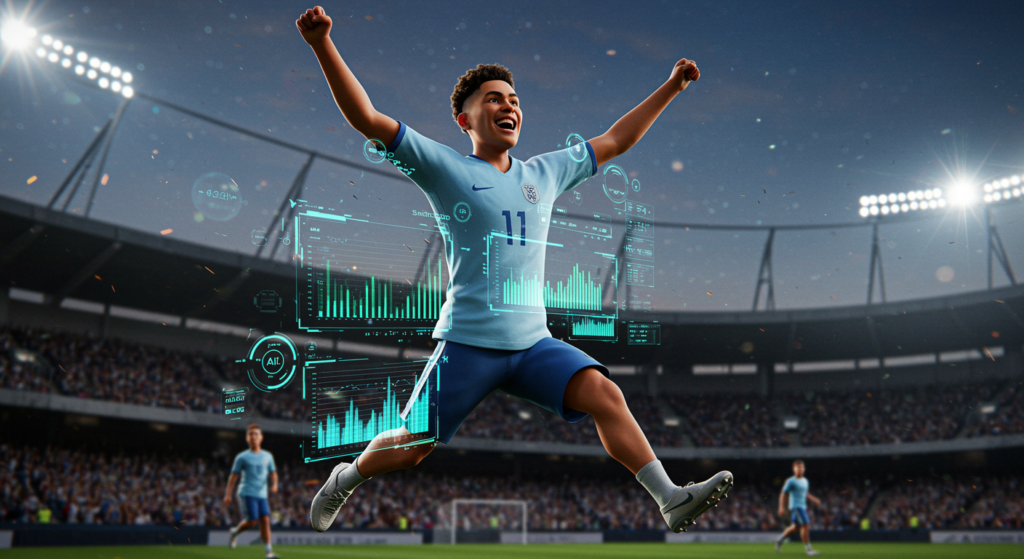
AI in Sports: Powering Innovations for the Next Era
Imagine stepping into a stadium where every play, every strategy, and even every fan’s experience is enhanced by cutting-edge technology. AI in sports is at the forefront of this transformation, reshaping how athletes train, teams compete, and fans connect. From predictive analytics that forecast game outcomes to innovative gear that adapts in real time, this technology is not just changing the game—it’s redefining it for a smarter, safer future.
The Rise of AI in Sports: A Game-Changer for Modern Athletics
AI in sports is rapidly evolving, integrating tools like machine learning and big data to revolutionize player performance, coaching tactics, and fan interactions. This shift allows teams to uncover hidden insights from vast datasets, leading to more informed decisions and a true competitive edge. Have you ever wondered how top athletes seem to anticipate moves before they happen? It’s often thanks to AI’s ability to analyze patterns faster than the human eye.
Key Innovations Driving AI in Sports
At its core, AI is powering several key areas that are pushing sports into uncharted territory. For instance, performance optimization uses wearable tech to track an athlete’s every move, while predictive analytics helps prevent injuries by spotting early warning signs. These advancements aren’t just theoretical; they’re already in play, helping teams like those in the NBA or Premier League stay ahead.
- Performance optimization: AI-driven wearables monitor vital signs, enabling customized training that boosts endurance and reduces fatigue.
- Predictive analytics: Algorithms forecast potential injuries, allowing coaches to adjust routines proactively.
- Game strategy: In-depth analysis of video footage reveals opponent weaknesses, turning data into actionable insights.
- Equipment innovation: Smart gear, like AI-enhanced balls, provides real-time feedback for better accuracy and safety.
- Fan engagement: Personalized content keeps audiences hooked, from tailored highlights to interactive apps.
Boosting Athlete Performance with AI Technologies
One of the most exciting aspects of AI in sports is its role in athlete development, where data turns into personalized plans that elevate performance. Coaches are now using AI to analyze metrics from wearables, creating training programs that adapt to an athlete’s unique needs. This means less guesswork and more precision, helping stars recover faster and perform at their peak.
Predictive Analytics for Injury Prevention in Sports
AI doesn’t just track progress—it predicts problems before they arise. By examining data from past games and current biometrics, algorithms can flag risks like overexertion or poor form. For example, a runner might get an alert to adjust their stride, potentially avoiding a season-ending injury. This proactive approach is saving careers and making sports safer overall.
Consider a scenario where a soccer player wears a smart sensor that detects irregular movements; AI could recommend immediate rest, preventing what might have been a major setback. Tools like these are backed by research, such as studies from leading sports institutes, showing a significant drop in injury rates.
AI-Driven Training and Recovery Strategies
- Real-time monitoring: Devices track heart rate and hydration, offering instant advice to optimize workouts.
- Personalized rehabilitation: Custom programs use biomechanics data to speed up recovery from injuries.
- Optimized nutrition: AI analyzes metabolic data to suggest diet tweaks, ensuring athletes fuel up right.
If you’re an aspiring athlete, think about how incorporating these tools could transform your routine—starting with a simple app that tracks your runs and provides tailored feedback.
Strategic Insights: How AI Enhances Game Analytics
Coaches are leveraging AI in sports to dissect games like never before, turning hours of footage into strategic gold. This technology automates the analysis of plays, opponent patterns, and even crowd reactions, giving teams the upper hand in high-stakes matches. It’s like having a digital assistant that never misses a beat.
Automated Video Analysis in Competitive Sports
With AI, key moments in a game—such as a pivotal foul or a momentum shift—are identified instantly, allowing for on-the-spot adjustments. Teams can study rival strategies in detail, predicting their next move based on historical data. What if your favorite team used this to counter a star player’s signature shot?
- Identify key moments: AI flags goals or defensive lapses for quick review.
- Opponent analysis: Track player movements to uncover tactical patterns.
- Real-time recommendations: Get live suggestions that could change the game’s outcome.
Revolutionizing Sports Equipment with AI Integration
The equipment on the field is getting smarter, thanks to AI in sports innovations from brands like Nike and Under Armour. Think AI-powered shoes that adjust for optimal grip or balls that provide performance data mid-game—these aren’t sci-fi anymore. This tech ensures gear isn’t just functional; it’s finely tuned to the athlete.
Emerging AI-Driven Equipment for Enhanced Performance
From smart helmets that monitor impacts to aerodynamic apparel that reduces drag, AI is making equipment more responsive and safer. A tennis racket with built-in sensors, for instance, could offer real-time swing advice, helping players improve on the fly. These developments are backed by ongoing research in materials science and AI.
- Smart helmets: Detect and report potential concussions instantly.
- Aerodynamic shoes: Adapt to running styles to minimize injury risk.
- Real-time feedback: Gear that coaches users during practice sessions.
Elevating Fan Experiences Through AI in Sports
Fans are no longer just spectators; AI in sports is making every game feel personal and interactive. By analyzing viewing habits and preferences, AI delivers customized content, like AR overlays on live broadcasts or tailored merchandise suggestions. This level of engagement is turning casual viewers into die-hard supporters.
Personalized Strategies for Fan Interaction
Imagine watching a match with real-time stats popping up via augmented reality, or chatting with a bot that answers your questions about players. AI makes this possible, enhancing everything from ticketing to social media interactions. It’s a game-changer for leagues aiming to build loyalty.
- Real-time stats overlays: AR brings stats to life on your screen.
- Chatbots: Virtual assistants handle queries, making events more accessible.
- Dynamic recommendations: AI suggests tickets or gear based on your interests.
AI’s Role in Media, Broadcasting, and Stadium Efficiency
AI streamlines broadcasting by automating highlights and personalizing coverage, while in stadiums, it manages crowds and optimizes energy use. This ensures events run smoothly, from entry to exit. For example, AI could predict peak traffic times, reducing wait lines and improving safety.
AI’s Impact on Scouting and Talent Development
Scouting is getting a high-tech upgrade with AI in sports, where algorithms sift through data to spot emerging talents. By combining performance metrics with social insights, teams can make unbiased recruitment decisions, giving overlooked athletes a fair shot. This approach is transforming how future stars are discovered.
- Talent identification: AI scans global data to find hidden gems.
- Performance projections: Models predict a player’s potential success.
- Fairer evaluations: Data reduces human bias in selections.
Navigating Challenges and Future Trends in AI for Sports
While AI in sports offers immense benefits, it also raises issues like data privacy and ethical concerns. Ensuring transparent use of AI is essential to maintain trust among players and fans. Still, the potential for growth is exciting, with advancements like generative AI poised to create even more personalized experiences.
The Future Landscape of AI Innovations
- Increasing use of generative AI for coaching simulations.
- Advanced predictive models for in-game health monitoring.
- Hyper-interactive experiences via VR and AR.
Wrapping Up: Why AI is the Ultimate Game-Winner
From training fields to global broadcasts, AI in sports is driving a wave of innovation that promises safer, more engaging, and equitable experiences for all. As we look ahead, embracing these tools could mean the difference between leading the pack or falling behind. What are your thoughts on how AI might change your favorite sport—share in the comments below, and explore more on our site for tips on getting started with tech in athletics.
References
1. “AI in Sports Industry,” Imaginovation, https://imaginovation.net/blog/ai-in-sports-industry/.
2. “AI in Sports,” Appinventiv, https://appinventiv.com/blog/ai-in-sports/.
3. “Innovative AI Strategies in Sports Analytics,” Number Analytics, https://www.numberanalytics.com/blog/innovative-ai-strategies-sports-analytics.
4. “How AI is Revolutionizing the Sports Industry,” STHQ, https://sthq.org/2025/02/14/how-ai-is-revolutionizing-the-sports-industry-8-takeaways-from-ces-2025/.
5. “AI in Sports,” Netguru, https://www.netguru.com/blog/ai-in-sports.
6. “Artificial Intelligence in Sports,” PwC, https://www.pwc.com/us/en/industries/tmt/library/artificial-intelligence-in-sports.html.
AI in sports, sports analytics, predictive analytics, athlete performance, fan engagement, AI-powered equipment, game strategy, injury prevention, fan experiences, talent development







